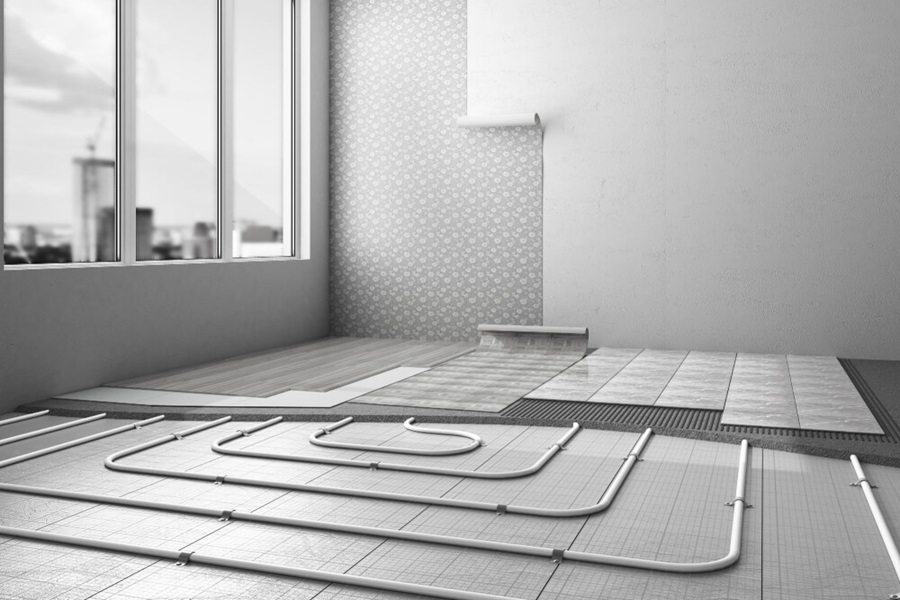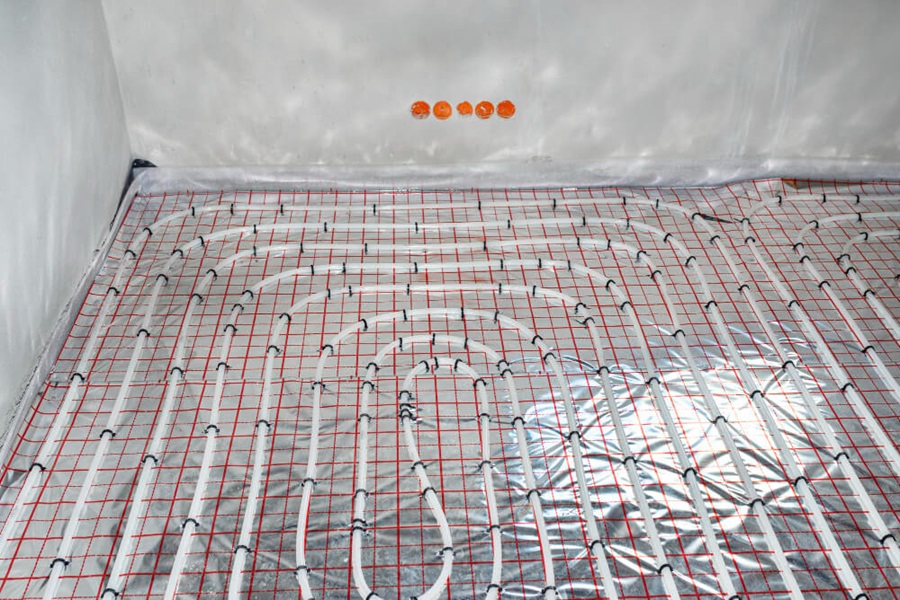Experience the perfect blend of warmth and style with our bathroom underfloor heating that keeps your bathroom comfortable all year round.
Shop Water Underfloor Heating Now
Key Points:
- Costs of underfloor heating in bathrooms.
- The best bathroom underfloor heating system depends on whether it’s a new build or renovation.
- Efficient installation of your bathroom floor heating
- Focus on high quality heating cables and insulation for better performance.
- Choose a thermostat that fits your lifestyle for optimal results
The bathroom has evolved from a purely functional space to a personal retreat. Adding underfloor heating enhances comfort, making cold mornings more enjoyable and turning your bathroom into a cosy sanctuary. Plus, it’s a sought-after feature that can increase your home’s value.
Wet or electric underfloor heating for bathrooms?
When installing any system, especially bathroom floor heating, it’s essential to consider the different underfloor heating options.
Electric Underfloor Heating: This system uses electric cables or mats installed directly beneath the bathroom floor. It’s ideal for renovation projects due to its minimal impact on floor height and quick installation time. Electric underfloor heating is favoured for its easier installation and quick heating capabilities—reaching the desired temperature in 30 to 60 minutes. This makes them excellent for warming up chilly bathroom floors and preventing mould and slips. However, installation requires a qualified electrician to connect the system to your power supply.
Wet Underfloor Heating: circulates warm water through underfloor heating pipes embedded in the floor. It starts with a boiler heating the water, which is pumped through tubing under the floor surface. This system is commonly used in new builds to add value and can be integrated with your central heating system. Still, these systems require a more complex installation process, including a thicker screed layer and boiler adjustments. This makes them less suitable for renovation projects where floor height is a concern.
Improving Heating Performance With Insulation Boards: installing insulation boards beneath the system optimises the cost and efficiency of your bathroom’s underfloor heating. These boards prevent heat from escaping downward, ensuring all the energy is directed upwards to heat the floor surface.
This not only aids the system’s efficiency by keeping the warmth where it’s needed but also significantly reduces the time it takes for the floor to heat up—from 2.5 hours to just 20 minutes. The rapid heat-up time contributes to overall energy savings, making the cost of bathroom underfloor heating more economical in the long run. Insulation boards can also aid with underfloor soundproofing.
Electric underfloor heating is perfect for bathroom renovations, with easy installation and quick heat-up time. Wet systems are ideal for new builds, where a more extensive setup can be accommodated.
Underfloor Heating Kits for Bathrooms
- 5m2 Electric underfloor heating 150w Sticky Mat kit
£105.24Incl. Vat: Special Price £84.19/£70.16 - 2m2 Novatherm Under Tile Electric Underfloor Mat
£51.24Incl. Vat: Special Price £40.99/£34.16 - 1.5m2 Novatherm Under Tile Electric Underfloor Mat
£43.14Incl. Vat: Special Price £34.51/£28.76 - 1m2 Novatherm Under Tile Electric Underfloor Mat
£32.40Incl. Vat: Special Price £25.92/£21.60
How to install your bathroom underfloor heating
Installing underfloor heating in your bathroom can enhance comfort and efficiency. Here’s a streamlined guide to get you started:
Preparation and Tools:
- Before beginning, ensure your bathroom floor is clean and stable.
- Gather necessary tools and materials: an underfloor heating system, thermostat, insulation boards (optional), duct tape, utility knife, scissors, multimeter, and tape measure.
- Note that a Part P registered electrician should make any electrical connections for safety.
Step-by-Step Installation:
- Measure and Order: Accurately measure your bathroom floor, excluding areas under fixtures like the toilet or vanity. Order slightly more heating material to cover awkward spaces.
- Read Instructions: Familiarize yourself with the manufacturer’s instructions for a smooth installation process.
- Clean and Insulate: Clean the floor thoroughly. If using insulation boards to prevent heat loss, lay them down and secure them with waterproof tape.
- Lay the Heating System: Unroll the heating mesh and position it across the floor, leaving gaps around the edges. Secure the mesh with duct tape and ensure wires are not damaged. Take a resistance reading with a multimeter to check for any issues.
- Handle Corners and Awkward Areas: Cut the mesh to navigate corners and use scissors to fit the wires into tricky spaces, ensuring they remain at least 50 mm apart.
- Install the Sensor: Place the sensor between the heating wires near where the thermostat will be installed. Secure it with duct tape or a small chisel-cut recess if needed. Record resistance readings again.
- Connect the Thermostat: Follow the manual to connect the thermostat and sensor to the heating system. Remember, a professional electrician should connect to the mains.
- Finish and Test: Add your bathroom floor covering once everything is in place. For tiles, grout can be applied directly over the mesh. Allow the grout to set before turning on the heating system for the first time.
This process ensures a well-installed bathroom underfloor heating system that keeps your space warm and inviting.

Cost of installing underfloor heating in bathrooms
Installing underfloor heating in bathrooms involves varying costs based on the system type. Electric underfloor heating is typically more affordable, as installation ranges from £50 to £100 per square meter. It’s ideal for smaller spaces and renovations due to its straightforward setup and energy efficiency, which reduces heating bills.
Wet underfloor heating integrates a central heating system and involves more complex installation, costing between £80 and £150 per square meter. While the upfront expense is higher, wet systems are highly efficient for larger bathrooms or new builds and may offer lower running costs over time. Despite the initial investment, both systems provide significant comfort and can increase property value.

Bathroom Underfloor Heating Thermostats
Choosing the right thermostat for underfloor heating in your bathroom can significantly enhance comfort and efficiency. Here’s a quick guide:
Manual Thermostats:
Dial thermostats are great if you prefer simplicity and occasional adjustment, as they allow you to set the temperature manually. However, they may not be the most energy-efficient choice for underfloor bathroom heating.
Programmable Thermostats:
Perfect for reducing energy bills, programmable digital thermostats let you set specific heating schedules. They are EcoDesign Lot 20 compliant, offering energy-saving features that optimize your underfloor heating system.
Smart Thermostats:
Smart app controlled thermostats are ideal for advanced control. They can be managed via smartphone apps and offer features like voice control and energy monitoring, making them great for tech-savvy users looking to maximize efficiency.
Dual Control Thermostats:
These versatile devices control underfloor heating and other elements, such as electric towel rails, from one unit, simplifying your bathroom’s heating system.
Choosing the right thermostat ensures efficient operation and enhances the comfort of your bathroom floor heating system.
New to Underfloor Heating?
Use below links to browse our key pages
- What is underfloor Heating?
- Installation Guides
- Try Out System Selector
- Visit Our Help and Advice Centre
- What Our Customers Say
FAQs
Is underfloor heating in a bathroom a good idea?
Underfloor heating offers a simple and efficient solution to keep your bathroom warm and comfortable. Although the initial installation cost may be higher compared to other heating systems for your bathroom, its energy efficiency can lead to significant savings on your heating bills over time.
How much does it cost to install underfloor heating in a bathroom?
The cost of installing underfloor heating can vary depending on the size of the area and the type of system used. However, it is often considered a worthwhile investment due to the long-term energy savings and comfort it provides.
Can underfloor heating be installed in a bathroom?
Yes, underfloor heating can be installed in a bathroom. If you are renovating or updating the flooring in your bathroom, installing an underfloor heating system is definitely worth considering
Is underfloor heating expensive to run in a bathroom?
Underfloor heating is more cost-effective than central heating systems as it operates at lower temperatures while providing the same level of comfort. The running costs depend on factors such as room size, duration of use, and the quality of insulation in the space.
Get A Bespoke Quote Today
You can now take advantage of our online quote system.
Just fill up a short form with your name, number, email and project details and we will get in touch with a bespoke quote for you.
